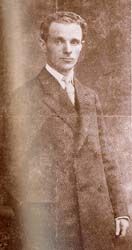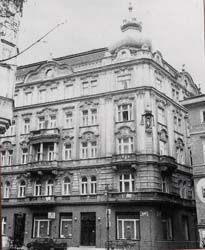Kafka took a fairly active part in the cultural life of Prague particularly during his time at the university and in his first years of employment. He enjoyed attending cultural events in the company of friends or with his favourite youngest sister. His attendance at cultural events waned somewhat when his close friends married, and after the onset of his illness he would only attend if it was an event of exceptional interest. Kafka was one of the few Prague German writers, apart from Brod, who also attended Czech theatrical performances and lectures and he may be therefore regarded as a link between the two local cultures that were still divided by the wall erected on both sides by aggressive nationalism.
Kafka had a very intimate, and at times even admiring, attitude to Czech national feelings, Czech culture and the Czech language. It was not an aloof relationship – the traditional interest in Czech history and love for Bohemia as a legacy of erstwhile provincial patriotism. Kafka lived in direct contact with Czechs in his everyday life. He had a strong (mostly passive) command of the Czech language, admiring its musicality and shades of meaning. He was even bold enough to make psychological and etymological comments on Czech expressions. He enjoyed reading Czech authors in the original language, and even recognized the talent of one of them (Vladislav Vančura) earlier than the Czech literary critics. At the same time he could be critical of widely-accepted works of Czech culture although he strove to promote their wider recognition (such as the work of the sculptor František Bílek), relying on his friend Max Brod’s skills as a publicist.
Theatre

© Archiv Klaus Wagenbach, Berlin
Kafka would frequent the New German Theatre (now the State Opera) and the Land (Estates) Theatre, particularly when there were performances by famous German (Viennese) actors such as Pallenberg or Moissi. On occasions, in defiance of contemporary political convention, he would attend the Czech National Theatre to see plays by Czech writers (e.g. Vrchlický) or other Slavic playwrights (e.g., Voinovich). On two occasions he was captivated by the unsophisticated folk theatre of Hasidic actors from Lvov [Lemberg] who performed at Savoy Café on Kozí plácek Square (Ziegenplatz). On the occasion of their second visit to Prague, Kafka attended as many as twenty of their performances and formed a friendship with the leading actor Jizchak Löwy. He devoted many pages of his diaries to the troupe and its plays.
Music
Franz Kafka felt alienated from music on account of his unmusicality. He would only rarely go to concerts, mostly at the request of Max Brod. In his younger years, he was captivated by the ballet performances of the Moscow Academic Art Theatre (MKAT). He enjoyed the variety show – then in fashion – at the Lucerna Hall which came into operation in early 1910s. He noted his impressions of some of the cabaret performances in his diaries.
Art
Kafka was particularly interested in art. At one time, after he graduated from university and was dissatisfied with the prospects of a career in law, he considered the possibility of taking up art as a profession. He followed with interest the work of a number of contemporary artists from both the German and the Czech communities, and made friends with some of them. He vigorously protested against proposed illustrations to The Metamorphosis that were out of tune with his own concept.
Lectures and readings
In his younger years Kafka assiduously attended literary lectures and public readings by writers who were present in Prague. He himself particularly enjoyed reading from his own and others’ works. He would give readings at home, for friends, and in public. It was the custom of the four friends of the ‘Prague Circle’ to meet in one of their apartments’ (usually Baum’s) and read to each other from their own (often also unfinished) manuscripts. Kafka’s listeners left written tributes to his excellent and inimitable reading style. It would seem that Kafka’s unusual punctuation was determined by the requirements of the text’s distinctive rhythmical structure. Kafka made a similarly strong impression on his audience at a lecture he gave at the Jewish Town Hall on the Yiddish language. His stylistic and oratorical skills were recognized at the very beginning of his career as a civil servant when he was given the task of writing and delivering a speech of welcome to mark Dr Marschner’s appointment as director.
Cinema
The cinematograph was a great discovery for young Kafka. He became an ardent admirer of this new invention, a source of education and amusement. He liked to go to cinemas in Prague, being captivated by the technique of the ‘theatre of live images’, with its unexpected possibilities, as well as by the performances of the stars of the silver screen, still silent at the time.
Newspapers and periodicals
Kafka was a regular reader of the liberal German daily Prager Tagblatt to which his family subscribed. He also read the Jewish Selbswehr with which he had personal ties through Felix Weltsch and Hugo Bergmann, and Die neue Rundschau, published in Frankfurt. At the time of his correspondence with Milena Jesenská, he used to read Czech journals, including the recently-founded Tribuna, to which Milena contributed and surprisingly even browsed the specialist Naše řeč (Our Language) and Náš skautík (Our Little Boy Scout), a magazine of the Czech scout movement. He did not find much inspiration from the reading of periodicals and only occasionally noted a particular article in his letters or the diaries.
Cafés
